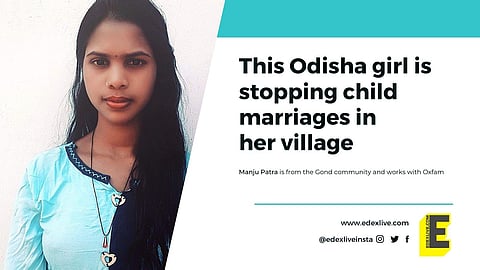

Most girls here do what they’re told, behave as they are told...but not me, says Manju Patra (22), who over the years has become a voice of resistance against child marriages in Bhorbata, a village in Odisha’s Kalahandi district with a tribal majority. Manju, who belongs to the Gond tribal community, says, “I am currently in the process of stopping two underage marriages from happening, in one case the girl is underage and in another the boy is underage,” Manju says.
Manju is driven by the story of her mother, who was married off by her family when she was merely 14, to her father who was 17. Her mother gave birth to 14 children out of which only four survived. The 2015-16 National Family Health Survey (NFHS-4) found that about 22.9 per cent of women aged 20-24 were married before they turned 18 in the district. Not just that, 5.7 per cent of girls between the age of 15 and 19 who were already mothers or pregnant at the time of the survey.
Manju became aware of the problematic realities around her only when Oxfam India held a workshop with adolescent girls on child marriages and gender sensitivity. This was in 2017. “Girls here are asked to drop their education after Class 10, boys drop out after Class 7 or Class 8 to work as daily-wage labourers,” Manju says.
The pandemic has made it worse for the young ones in the village. “A year of being at home has made several students here lose interest in education. This has led to many of them getting marriage proposals,” Manju says.
A study conducted by Oxfam in the months of May and June 2020 surveyed 1,158 parents, across private and government schools, and 488 government school teachers across five states — Bihar, Chhattisgarh, Jharkhand, Odisha and Uttar Pradesh. The report suggests that over 80 per cent of parents reported that their children lacked access to online education and many children may not go back to school.
The backlash
Manju says that she obviously faces a strong backlash from the fellow villagers. “They say that it influences their daughters negatively. Sometimes the parents of the underage groom or bride hurl abuses at me, they had even reached out to my parents,” Manju says. Manju was even surveilled and followed around once. People spend a lot in these marriages and that financial loss is what triggers them more, she adds. There were people who even threatened to defame her on social media using her picture. “I do fear these things at times,” she says. But there are also a great many people who support her.
Anthems of resistance
Ye mere hak ki zindagi, mein khud hee jeena chahti hoon (I have a right to live, I have a right to live on my own terms), this is a line from one of her poems. Centred around the social issues that she feels strongly about, these poems and songs are having an intangible impact on the social fabric that holds her village together. She conducts workshops on gender-sensitive issues. She talks of sex education with young girls, she talks against child marriages in the community, she raises her voice against domestic violence — all through her anthems and her activism.
“I write in Hindi, Odia and Kalahandia,” she says. Her poetry took a socio-political turn after she started working with Oxfam. “I’ve even made small films on periods and sex education,” she says. According to the the last census, Odisha ranks 13 on the list of high prevalence of child marriage where more than 4 lakh were married between the age of 10 to 19 and 80 per cent of them were females while 20 per cent were young boys.
Her path to freedom
Manju is living on her own terms today. She says her parents have come to accept her choices, but that wasn't the case before. After her Class 12, she wanted to move to a nearby town for higher education. “Like most of them, my parents too wanted to marry me off early,” she says. Her parents told her that she would be allowed to study ahead but on the condition that she would live with her uncle and aunt who’ll be able to keep an eye on her and teach her household chores. But this wasn’t her. This was never her. She was always a misfit amongst people who wanted her to be submissive — Manju wanted to live in a hostel, live her own life.
“They didn’t let me get admission for a year. It was only after Oxfam members spoke to my parents that they let me leave and live in a hostel while pursuing a BBA degree,” Manju says.
But even that was a struggle. Like for several other young girls in this country, Manju was forbidden from even talking to a boy. “The hostel authorities used to call up home the moment they saw me with a boy,” she says. She recalls that this one time her uncle and aunt reached the college. “My aunt slapped the boy. My family warned me never to talk to any boy again,” she says. Now she laughs about all of it. The times have changed for her. Her parents have accepted that their daughter will never listen, they have made their peace with it.
